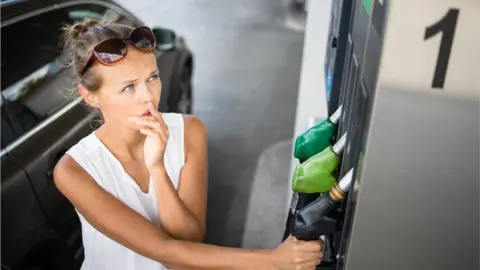Cost of filling a tank falls by £5 in July
 Getty Images
Getty ImagesThe price of petrol fell in July, knocking nearly £5 off the cost of filling a tank, according to the RAC.
Average petrol prices dropped by nearly 9p over the month to 182.69p per litre, while diesel fell by almost 7p to 192.38p per litre.
But the motoring group warned the reductions still don't fairly reflect the fall in the wholesale price of fuel.
It said major retailers should be cutting pump prices much further.
Fuel prices have soared in recent months, driven by the war in Ukraine and moves to reduce Europe's dependence on oil from Russia, a major supplier.
With food and energy bills also surging, many households are feeling financial strain.
Wholesale petrol prices peaked at the start of June, but have since fallen as the price of oil has dropped back. Fears of a recession in the US and elsewhere have hit demand for oil, and the price of Brent crude - the international benchmark for oil - has fallen to around $100 a barrel, after soaring when Russia invaded Ukraine.
'Falling too slowly'
The RAC said nearly £5 was shaved off the cost of a 55-litre tank of petrol in July, from £105.29 down to £100.48, as retailers lowered their prices.
The cost of filling up a diesel tank dropped by £3.68 over the month.
These are the third and fourth biggest monthly reductions, respectively, in the last 20 years.
However, the RAC says the falls are still too slow, given the significant reductions in the wholesale price of fuel.
Wholesale petrol prices have fallen by 20p over the last eight weeks, whereas the average price paid for unleaded by drivers has only dropped by 9p in July.
Based on average wholesale prices last week, the RAC says petrol should be around 167p per litre, not 183p.
It warned that the failure of major retailers to slash petrol pump prices in line with the fall in wholesale costs of unleaded is costing drivers, who are paying nearly £9 a tank more than they should be.
RAC fuel spokesman Simon Williams said the biggest retailers should have "cut their prices more significantly on a daily basis", given the steady and consistent fall in the wholesale price of petrol.
He said their unwillingness to do this made July "an unnecessarily tough month for drivers".
However, some fuel analysts argue that is not a fair comparison.
"Over the last eight weeks, prices have jumped around; it's understandable if retailers have tried to smooth those differences out in their prices," said Steve Irwin, director at Portland Analytics.
"There is often a lag between wholesale prices dropping and a drop in prices at the pump. I expect we will see further price drops in petrol in forecourts over the next week or so of a further 5, 6 or even 7p a litre."
While the drop in petrol prices is good news for drivers, Mr Irwin warned it is not necessarily a good sign for the economy.
"The market is clearly worried about a downturn, with people cutting back this autumn and winter, and that is being factored into the wholesale price," he said.
"If signs of that downturn don't materialise, prices may go back up again. If the market thinks they are, they could fall further."
